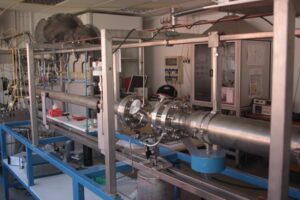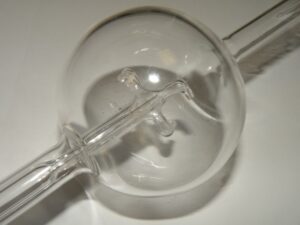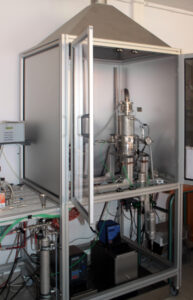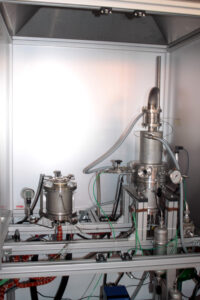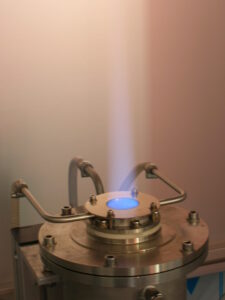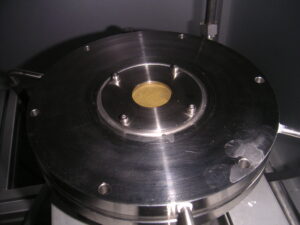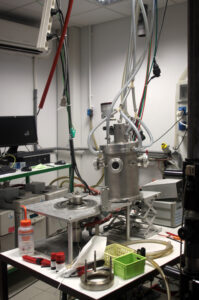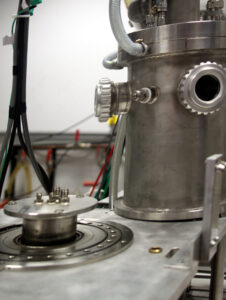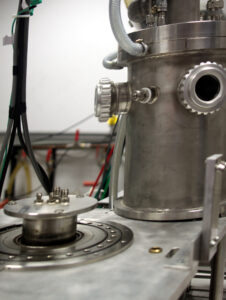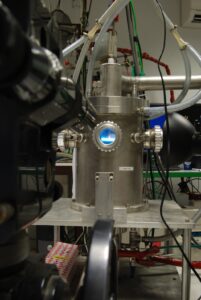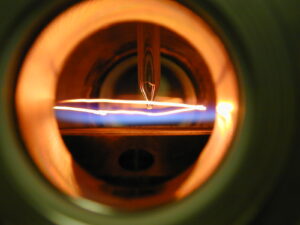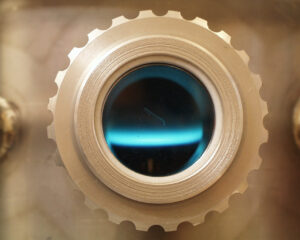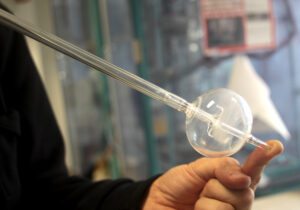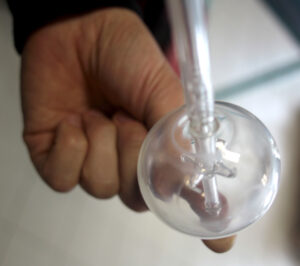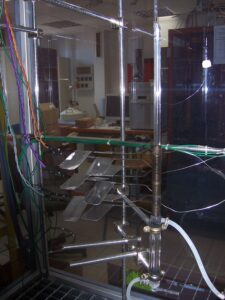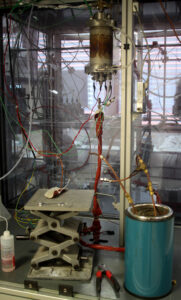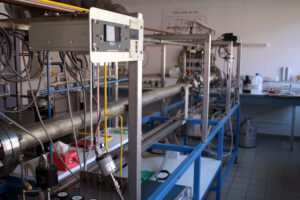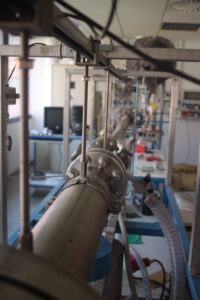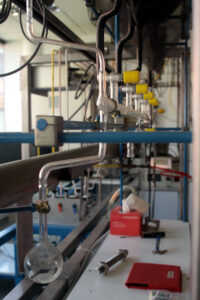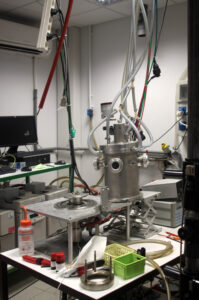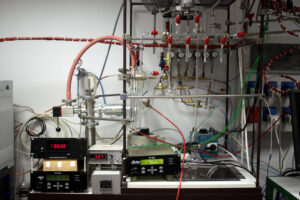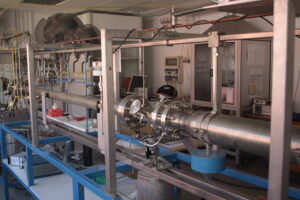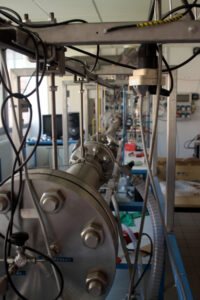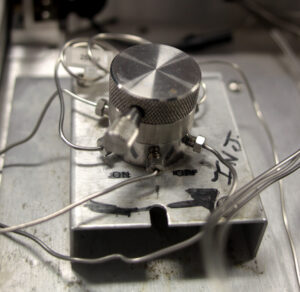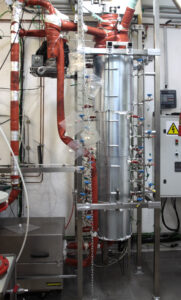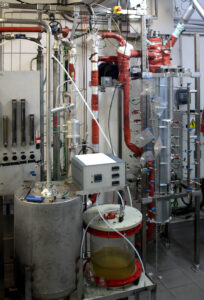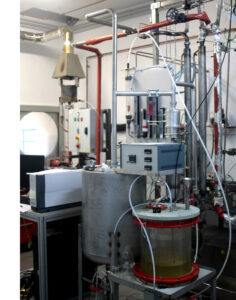CiTHerE
Kinetics, Thermodynamics, Energy
The CiTherE axis comprises specialists in chemical kinetics, thermodynamics and chemical reaction engineering. The main focus is on energy, with the aim of developing energy systems that are more efficient, more economical and more respectful of the environment, through an approach combining physical chemistry and process engineering. The experimental and theoretical work developed in this area leads to an original approach that enables us to move from the understanding and modeling of phenomena at the molecular scale to the scale of the reactor or process.
Research focuses on 3 themes:
- the kinetics of pyrolysis, oxidation and combustion reactions, covering fields such as the formation and exploitation of petroleum, combustion in engines or burners, the formation of pollutants and the destruction of toxic chemicals by thermal means.
- thermodynamics for processes, including the thermodynamics of phase equilibria and the rational use of energy. Key areas of study include the development of equations of state applicable to a wide range of industrial processes, and the design of environmentally-friendly solvents for extraction operations or for thermodynamic power or refrigeration cycles.
thermochemical conversion of biomass, including pyrolysis, gasification and liquefaction to produce green synthons or energy carriers (syngas, liquid fuels). Research covers different scales: 1) the study of reactions on a molecular scale, with original analysis methods, 2) the study of reactors (modeling and testing) and 3) the environmental analysis of processes.
Thermal reaction kinetics: pyrolysis, oxidation, combustion
The studies carried out in this theme are aimed at developing detailed kinetic models for the pyrolysis, oxidation or combustion processes of purely hydrocarbon compounds or those containing heteroatoms (O, N, S, Cl, etc.). These models provide important chemical information, such as the nature and quantities of pollutants formed, auto-ignition times, the effect of additives on fuel reactivity, and the evolution of oil composition. These studies have led to the creation of an automatic mechanism generation software package (EXGAS), currently adapted to hydrocarbons as well as certain biofuels (alcohols, esters). In parallel, experimental measurements in ideal reactors are carried out to obtain the data needed to develop and validate these models. Similarly, ab initio calculation methods are used to obtain the rate constants required for simulations.
Skills
- Experimental study of pyrolysis/combustion reactions in ideal reactors (gas-jet self-actuated reactor, flat flame burners, shock wave tube, batch and piston reactors, etc.).
- Analytical techniques for quantifying reaction products (GC, GC-MS, CRDS, FTIR)
- Automatic generation of detailed kinetic mechanisms (EXGAS) and numerical simulations (Chemkin-Pro)
- Determination of rate constants and thermodynamic data (DfH°298K, S°298K, Cp°(T)) using quantum chemical methods (gaussian, molpro) and kinetic theories.
Equipments
- TOC: shockwave tube
- Hydrocarbon-laden gold tubes, closed and placed in an autoclave.
- Experimental range: 300 - 500°C 1h - several days 1 bar - 700 bar
- Jet Stirred Reactor
Thermochemical conversion of biomass
The research activities associated with this theme are based on a multi-scale approach that covers everything from molecular mechanisms to reactors and overall process analysis.
At the molecular level, we study the mechanisms of pyrolysis and liquefaction of biomass and its constituents (cellulose, lignin, etc.). We are also studying the catalytic reactions of biomass deoxygenation and coal oxidation. At the reactor scale, we are studying fluidized beds (tests from 1g to 10kg/h at LRGP) and lignin and waste pyrolysis/liquefaction reactors. At the process scale, we are developing models using Aspen Plus software to predict the material and energy balances of processes, from resource mobilization (transport, pretreatment) to pollutant emission. These data are used to conduct environmental analyses of the processes.
Skills
- Pyrolysis - gasification of biomass and waste
- Liquefaction of biomass, celluloses and lignins
- Fluidized beds
- Tar analysis by on-line mass spectrometry, gas and liquid chromatography
- Catalytic pyrolysis
- Catalytic reforming of methane and tars
- Selective polymer depolymerization
- Hydrotreating reactions and catalytic reactors
- Characterization and reactivity of carbons (coal, coke, etc.)
- Solar thermochemical reactors
Equipments
Test benches
- Cyclone pilot
- Fluidized bed pilot
- Micro fluidized bed coupled with catalytic beds
- Twin-screw reactor
- Image furnace
- Coupling of pyrolysis reactor and perfectly stirred reactor or fixed bed
- Laser pyrolysis system
- Gas/solid fixed bed at very high temperature (1800°C)
- Gas/solid fixed bed for catalysis
- Thermobalance coupled with calorimetry
- Gas analysis: several µGCs, numerous GCs
- Liquid analysis: LC/MS-UV-RID, GC*GC/FID-MS, Karl Fisher
- Solids analysis: N2 sorption, Hg porosity, elemental analysis, ICP-MS, SEM, Raman, etc.
- Kinetic models (molecular scale) under CHEMKIN
- Grain models (particle scale): coupled heat transfer, material transfer and reaction models
- Reactor models: coupled hydrodynamic, transfer and reaction models
- Process models in ASPEN Plus: detailed reactor modeling coupled with Fortran
Process thermodynamics
Skills
- Development of innovative and predictive equations of state for accurate process simulation (chemical industry or energy conversion).
- Development of algorithms combining resolution of phase equilibrium conditions and stability analysis.
- Experimental determination of phase diagrams, infinite dilution activity coefficients, densities, heat capacities and enthalpies.
- Use of the product-design approach to design neoteric solvents such as ionic liquids or new working fluids for thermodynamic cycles.
Equipments
The PPR78 model
PPR78 stands for Predictive Peng-Robinson 1978. This model uses the 1978 version of the PENG-ROBINSON equation of state, the VAN DER WAALS mixing rules, and assumes that the binary interaction coefficient kij is a function of temperature T only. The method is made predictive by calculating kij using a group contribution method.Members
Mohamed Hechmi AISSAOUI, Chercheur
Jana ALKOUSSA, Doctorant
Dominique ALONSO, Maître de Conférences
Gabriel BATALHA DE SOUZA, Doctorant
Frederique BATTIN-LECLERC, Directeur de recherche CNRS
Manon BECHIKHI, Ingénieur d'études
Ruddybel BENJAMIN TIBURCIO, Doctorant
Ryma BENRABAH, Chercheur
Haziq Ridwan BIN ASMUNI, Doctorant
Roda BOUNACEUR, Ingénieur de recherche
Mohammed BOUROUKBA, Maître de Conférences
Valérie BURKLE-VITZTHUM, Professeur des universités
Thierry CACHOT, Professeur des universités
Fabiola CITRANGOLO DESTRO, Chercheur
Fabiola CITRANGOLO DESTRO, Chercheur
Julien COLIN, Maître de Conférences
Lucie CONIGLIO-JAUBERT, Maître de Conférences
Le Minh DINH, Doctorant
Anthony DUFOUR, Directeur de recherche CNRS
Guillaume DUMET, Doctorant
Timothée FAGES, Doctorant
Marilyne FARHAT, Doctorant
René FOURNET, Professeur des universités
Pierre Alexandre GLAUDE, Directeur de recherche CNRS
Rachid HADJADJ, Chercheur
Olivier HERBINET, Maître de Conférences
Nathalie HUBERT, Maître de Conférences
Boutaina ILLOUSSAMEN, Doctorant
Jean-Noël JAUBERT, Professeur des universités
Jean-Noël JAUBERT, Professeur des universités
Jean-Noël JAUBERT, Professeur des universités
Julien JOLIAT, Post-Doc
Syrine JOUINI, Doctorant
Nour LABAKY, Doctorant
Silvia LASALA, Maître de Conférences
Yann LE BRECH, Maître de Conférences
Luca MAFFEI, Doctorant
Guillain MAUVIEL, Professeur des universités
Alvina MENDY, Doctorant
Jean-Charles MOISE, Maître de Conférences
Fabrice MUTELET, Maître de Conférences
Loren NIZARD, Doctorant
Francisco Carlos PAES, Chercheur
Dominique PETITJEAN, Professeur des universités
Luis Angel PINILLA MONSALVE, Doctorant
Vishal Kumar PORWAL, Chercheur
Romain PRIVAT, Professeur des universités
Yann QUIRING, Doctorant
Viviane RENAUDIN, Professeur des universités
Boris ROUX, Doctorant
Camille RUBIO, CDD (catégorie B)
Camille RUBIO, CDD (catégorie B)
Camille RUBIO, CDD (catégorie B)
Konstantin SAMUKOV, Doctorant
Yves SIMON, Maître de Conférences
Baptiste SIRJEAN, Chargé de recherche CNRS
Roland SOLIMANDO, Professeur des universités
Kanika SOOD, Post-Doc
Yireth Andrea VEGA BUSTOS, Doctorant
